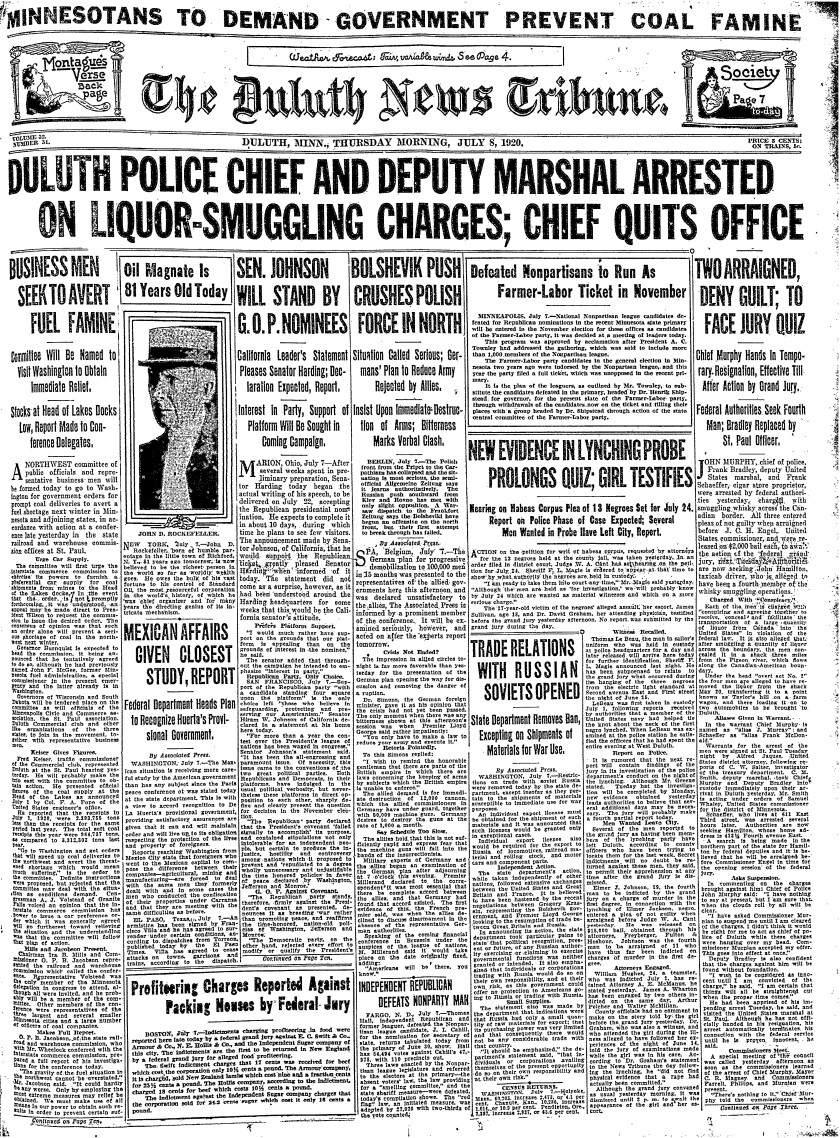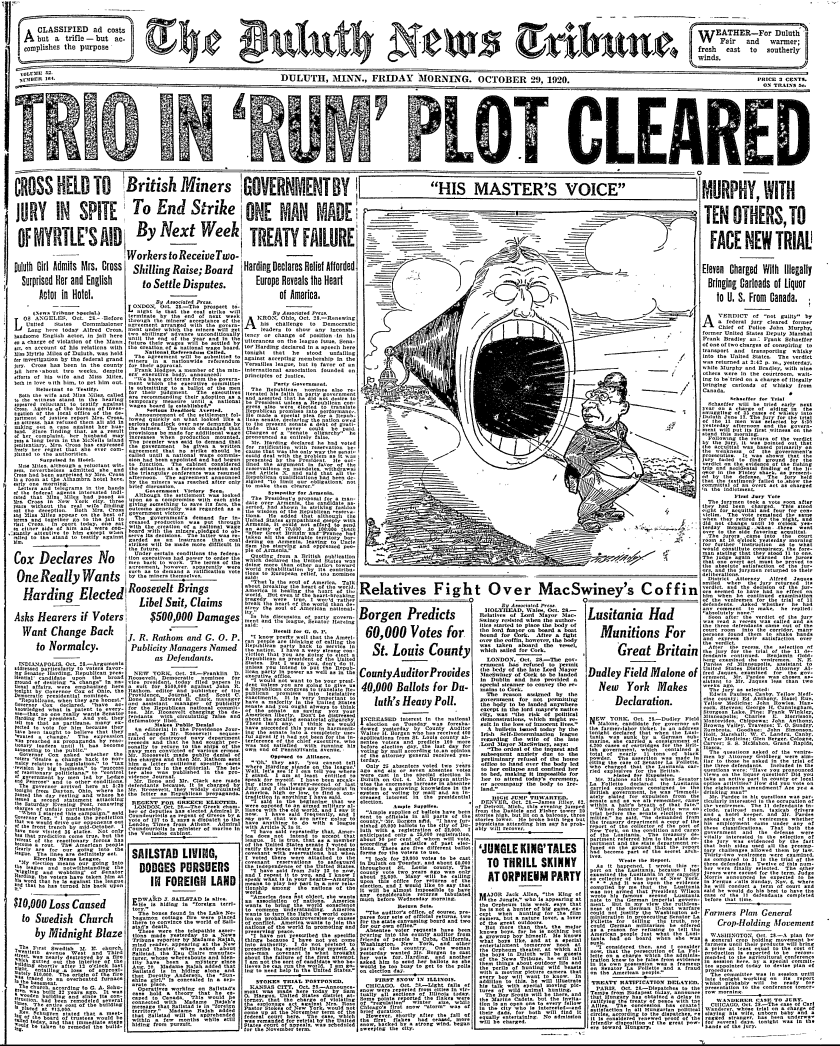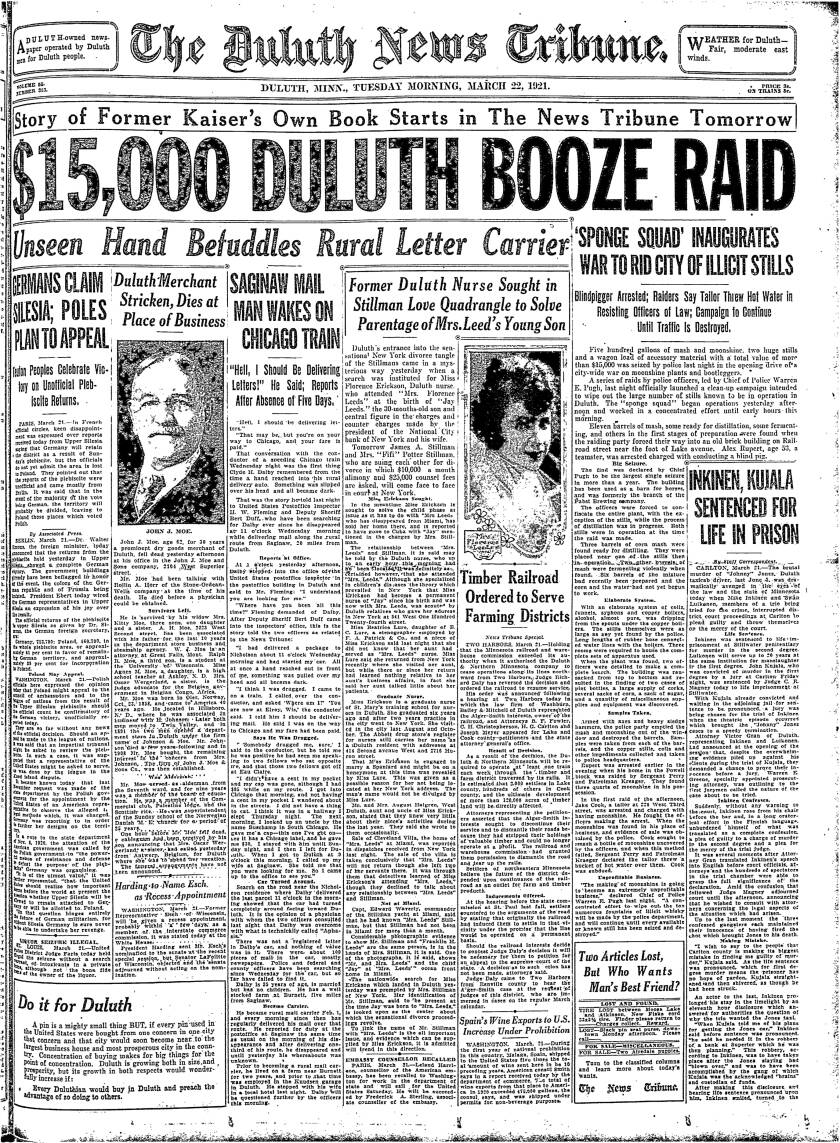DULUTH — When Prohibition became the law of the land in January 1920, it didn't take long for liquor to start flowing across the Canadian border into northeastern Minnesota.
Customs officials were told to keep a close eye on trains, vessels and automobiles entering the United States. Cargo was searched, and boats were stationed on the Great Lakes to watch for suspicious activity. Authorities triumphantly announced the break-up of smuggling rings and the seizure of casks of whisky.
But it rapidly became apparent that federal, state and local authorities were grossly overmatched in their efforts to combat cross-border transportation and backwoods brewing operations that supplied an entire industry of speakeasies across the Northland.
"Smuggling of whisky from Canada into northern Minnesota, its illegal manufacture in the northern wilderness, and its sale in the cities on the range and in Duluth cannot be effectively curtailed at the present time," the Duluth News Tribune reported in November 1920, citing a report from Duluth-based federal prohibition agents.
The paper reported that the "little fellows" — farmers, laborers and owners of soft-drink parlors — were in the majority of those caught in the first year of constitutional Prohibition. The region's 68-agent force was simply ill-equipped to deal with major rum-runners keeping the revelry alive in the Northland.
ADVERTISEMENT
"The men who have been manufacturing the stuff that these are selling have seldom been captured," the paper reported. "Prohibition agents admitted that on many occasions the moonshiners have seen the agents before the agents ever saw them. This, they say, has been due to the lack of agents. One or two would be assigned to a small town, and within a short time, many in the neighborhood had been informed that 'the revenue men are in town.'"

Duluth police chief arrested for smuggling
Headlines described daily confiscations of casks hidden within rail shipments and grand jury indictments for men accused of liquor smuggling — some of them rather prominent members of the community, including Duluth's police chief, John Murphy.
Most remembered for his role in the arrests of several Black men who were lynched by a mob in downtown Duluth, Murphy was arrested just weeks later, along with a deputy U.S. marshal, for allegedly attempting to smuggle 1,236 bottles of liquor from the Pigeon River in Cook County to Duluth for illegal distribution.
Murphy, a former railroad man who had no law enforcement background when appointed chief in November 1919, also was indicted on a second case that alleged a conspiracy to transport a large quantity of liquor from Fort Frances, Ontario, to Eveleth in freight cars operated by the Duluth, Winnipeg and Pacific Railway, whose employees were also among those charged.
By the time Murphy and several co-defendants were set to go to trial in July 1920 — with a legal defense team including three Iron Range mayors — it had become clear the federal courts were already overwhelmed by the influx of smuggling cases.
"I am worn out after six months of continual trial on these liquor cases," Judge Page Morris said, announcing a three-month postponement to a stunned audience that had gathered to see the spectacle inside the Duluth courtroom. "Despite my efforts to the contrary I find myself in an irritable frame of mind. These defendants are men of high standing and I don't think I should hear this case, feeling as I do now."
ADVERTISEMENT
When he went to trial in October, Murphy would be acquitted after testifying that he stumbled upon the liquor in a remote shack during a fishing trip and dutifully transported the evidence back to Duluth police headquarters (where dozens of bottles would later go missing from a sealed vault). Despites his efforts, the suspended police chief never achieved reinstatement to his position.

'Blind pigs' replace saloons as law struggles to keep up
In the Twin Ports, and around the region, it wasn't hard to find illegal drinking establishments. Locally, speakeasies were commonly referred to as "blind pigs" and frequently run out of soft-drink parlors.
Arrests and fines of business owners were common, as were citations of patrons accused of the crime of drunkenness. Police touted raids that they hoped would not only eliminate existing liquor from the streets but help deter would-be bootleggers from setting up shop.
"The making of moonshine is going to become an extremely unprofitable business," Duluth Police Chief Warren E. Pugh predicted after an operation known as the "Sponge Squad" kicked off with the seizure of 500 gallons of mash and moonshine, two huge stills and a wagon-load of accessories worth $15,000.
"A concentrated effort to wipe out the too numerous fountains of illicit whisky will be made by the police department and will continue until every available or known still has been seized and destroyed."
But demand for booze always far exceed enforcement capabilities, largely rendering police raids ineffective — as illustrated by a December 1920 dispatch from the Iron Range:
ADVERTISEMENT
"A few hours after Chief of Police (Edward) Cloutier issued an official statement that Chisholm has been freed of all lawlessness, and that there is no more blind pigging going on, federal agents raided a so-called soft drink place on Lake street and confiscated a quantity of moonshine."










